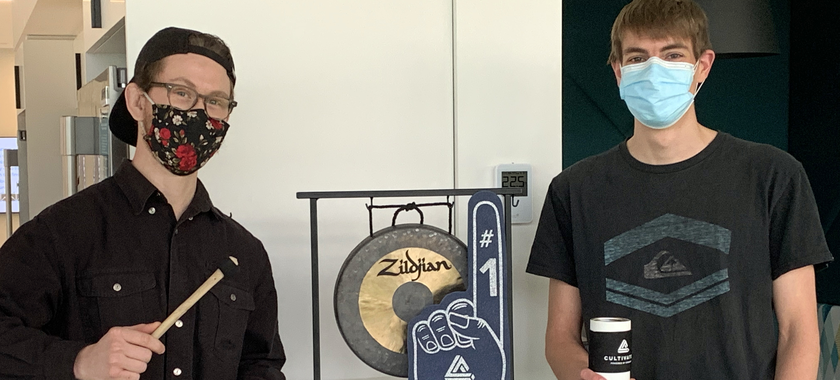When Innovation Saskatchewan and the Ministry of Environment hosted an Innovation Challenge in 2019 to find solutions for better waste disposal and diversion, Prairie Robotics won the challenge with the concept of artificial intelligence (AI) for waste management. This idea, called SightScale, used cameras and AI to weigh and identify waste entering landfills. Following commercialization of this solution, co-founders Sam Dietrich and Stevan Mikha quickly learned that an even greater impact could be received by applying this required data analysis at the household.
 “9 out of 10 people report that recycling is more confusing than learning about the stock market,” Sam Dietrich explains. “But 9 out of 10 people also enjoy recycling and know its importance to reduce climate change. There’s a huge dichotomy between people understanding recycling and wanting to do it.”
“9 out of 10 people report that recycling is more confusing than learning about the stock market,” Sam Dietrich explains. “But 9 out of 10 people also enjoy recycling and know its importance to reduce climate change. There’s a huge dichotomy between people understanding recycling and wanting to do it.”
The pivot from focusing on AI at landfills to AI on Recycling Collection happened when Dietrich and Mikha discovered that leaders in the industry and city officials didn’t want more data from the landfill but instead wanted to get to the source. Prairie Robotics quickly and aggressively adapted their AI for recycling collection trucks to identify the different types of materials that people attempt to recycle.
“You only get feedback on household things like water or utility, but what about waste?” Dietrich asks. “People roll their garbage and recycling carts out weekly but don’t know what they’re doing wrong or how to improve.”
Prairie Robotics’ recycling model goes through three distinct steps. First, cameras, GPS, and computers are installed on recycling trucks to audit every load, where images of each collection are automatically collected and assigned to individual households using high-precision GPS. Next, machine learning automatically identifies high-priority contaminants. Finally, residents are educated via mail-outs and emails sent directly to them to track recycling improvement at the household level.
Working with cities to implement fully automated education programs, residents can see images of previous contamination they have disposed of to engage them in proper recycling specific to their habits. “For people who want to improve their recycling habits, there are about 10% of the population that will look for the right information,” Dietrich says. “But for the majority of people, you’ve got to meet them where they are.”
“In five years from now, we’d love to increase the analytics that we’re providing,” continues Dietrich about future plans. “We want to expand from not only recycling but organics collection too. We want to look at waste collection solutions for all divertible materials that are improperly disposed of.”
Dietrich and the Prairie Robotics team are hoping to digitize this type of data for every resident, with the potential to sign in to an app and see usage—the same way households look at their water, gas, and electricity.
In the meantime—and with their already impressive tech—Prairie Robotics is 1 out of 30 companies (and the only Saskatchewan company!) admitted to Canada’s top AI accelerator, Next AI.
From winning the Innovation Challenge to pivoting their tech, Prairie Robotics has been thrilled to be receiving such great support from Saskatchewan. “We’ve gone through the whole funnel,” Dietrich smiles.
The Saskatchewan Advantage Innovation Fund (SAIF) has helped the team commercialize, and the Saskatchewan Technology Startup Incentive (STSI) has acted as major motivation for investors—which recently helped Prairie Robotics close a $690,000 seed round in July 2021. They are also supported by Saskatchewan's tech and business incubators, Co.Labs and Cultivator.
“It all comes down to relationships, and Saskatchewan is the easiest place to forge and leverage these relationships,” Dietrich finishes. “From ideation to commercialization, we’ve been grateful to be supported every step of the way.”
Founders: Sam Dietrich, Stevan Mikha
Incorporation Date: January 2017
Employees: 7


